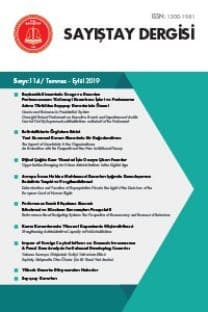ULUSLARARASI MUHASEBE VE DENETİM STANDARTLARININ ULUSAL DÜZEYDEKİ MEVZUAT İLE İLİŞKİSİ: TÜRKİYE ÖRNEĞİ
Günümüzde hemen her alanda karşılaştığımız “standartlar”, uluslararası kuruluşların öncülüğünde kurumsallaşıp, belli kurallar çerçevesinde uluslararası seviyede kabul edilen metinler haline gelmektedir. Sonraki aşama ise, uluslararası standartların ulusal düzeyde uygulanması, yani, yasal düzenlemeler ile meşru bir zemine yerleşmesidir. Bu çalışma ile küresel ölçekteki standartlaşma uygulamalarının, muhasebe ve denetim alanındaki seyri ve Türkiye’deki yansımaları anlaşılmaya çalışılacaktır. Bu amaçla uluslararası platformlarda kabul edilen muhasebe ve denetim standartları ile bunları oluşturan kurulların yapısı incelenmiş olup bu standartların Türkiye’de ne şekilde kabul gördüğü, uygulandığı, hangi araçların ve kurumların bu süreçte yer aldığı gibi hususlar üzerinde durulmuştur. Sonuç olarak, muhasebe ve denetim alanındaki standartların tavsiye nitelikli metinlerden, yasal düzenlemeler ile uygulanması zorunlu metinlere dönüştükleri; bu süreçte uluslararası metinlerin tercüme edilerek aynen benimsendiği ve ulusal standartlar haline geldiği, kamu sektörü için oluşturulan standartların özel sektörde uygulanan standartlara yakınsadığı ve aradaki farklılığın giderek azaldığı görülmektedir
Anahtar Kelimeler:
Standartlaşma, Muhasebe Standartları, Denetim Standartları, Küreselleşme, Yasal Düzenlemeler
THE RELATIONSHIP OF NATIONAL REGULATIONS WITH INTERNATIONAL ACCOUNTING AND AUDITING STANDARDS: THE EXAMPLE OF TURKEY
Today, the standards that we encounter in almost every field of life are first established by an international organization according to a defined due process, and they emerge as internationally accepted written texts. Next stage is to implement those international standards at the national level i.e. to position them on a legal basis with legal regulations. This study aims at understanding the course of the standardization practices at global scale in the fields of accounting and auditing, and their reflections in Turkey. For this purpose, the study focuses on the structure of the internationally accepted accounting and auditing standards and the boards which create them and on issues such as how those standards are accepted and implemented in Turkey and what kind of tools and entities take part in this process. Eventually, it is seen that the standards in the field of accounting and auditing were turned into obligatory texts from advisory tools through legal regulations; that, in this process, international texts were translated and adopted verbatim and became national standards; that the standards established for public sector converged private sector standards; and that the difference in between those gradually diminished.
___
- Addis, Micheal R. (2012), Achieving IASB Independence; Creating an Independent International Accounting Standards Board (IASB) through the Examination and Comparison of the Organizational Structures of the IFRS Foundation, the Financial Accounting Foundation (FAF), and the German Accounting Standards Committee (GASC), Pennsylvania State University.
- Best, Jacqueline (2009), Standarsizing Global Norms and Informalizing Authority: The IMF and World Banks’s New Policy Strategies, Paper Prepared for ECPR Joint Sessions, Lisbon 14-19 April 2009 https://ecpr.eu/Filestore/ PaperProposal/8a871ab8-0cfe-4987-a11f-bc79026e91dd.pdf. Tarihi:14.03.2016) (Erişim
- Demir, Volkan, Oğuzhan Bahadır (2009), UFRS TFRS Kapsamında İşletme Birleşmeleri ve Konsolidasyon, Nobel Yayın Dağıtım, İstanbul, Şubat.
- Demir, Volkan (2009), TFRS/UFRS Kapsamında Finansal Araçlar, Nobel Yayın Dağıtım, Ankara, Nisan, s. 1,2.
- Demirel, Burcu, Utku - Kemal Gürsoy (2011), Mali Çözüm Dergisi, Sayı 103, İstanbul Ocak-Şubat, s. 20.
- Güvemli, Oktay, Arif Aytulun, Bülent Şişman (2013), Türkiye’de Muhasebe Mesleğinin Gelişimi, MUFİTAD Dergisi, Sayı 4, Ocak, s. 19-49.
- IAASB (2015), IAASB Strategy Document for 2010-2015; Fulfilling Our Public Interest Mandate in an Evolving World, IFAC/ IAASB, http://www.ifac.org/sites/ default/files/publications/ files/IAASB-Strategy-2015-2019_0.pdf, (Erişim Tarihi: 14.03.2016).
- IFRS (2013), The IFRS Foundation Constitution; Revised and Approved by the Trustees.
- IFRS (2015), Who Are We and What We Do ? , IFRS Foundation /International Accounting Standards Board (IASB), http://www.ifrs.org/The-organisation/ Documents/2015/Who-We-Are-January-2015.pdf. (Erişim Tarihi: 14.03.2016).
- IIA (2012), IIA Resmi Websitesi, Uluslararası İç Denetim Standartları, https:// na.theiia.org/standards-guidance/mandatory-guidance/Pages/Definition-of- Internal-Auditing.aspx, (Erişim tarihi: 14.03.2016).
- IMF and WB (2011), 2011 Review of the Standards and Codes Initiative, Prepared by the Staff of IMF and WB; https://www.imf.org/external/np/pp/ eng/2011/021611.pdf. (Erişim Tarihi: 14.03.2016).
- INTOSAI (2014), The Purpose of the INTOSAI’s Professional Standards, http://www. issai.org/media/ 98499/purpose-of-intosais-professional-standards-updated- version-2014.pdf (Erişim Tarihi: 14.03.2016).
- INTOSAI (2010), Güney Afrika Deklarasyonu; http://www.issai.org/the-south-africa- declaration/, (Erişim tarihi: 14.03.2016).
- INTOSAI ISSAI 1200, http://www.issai.org/4-auditing-guidelines/general-auditing- guidelines/ (Erişim Tarihi: 14.03.2016 ).
- INTOSAI Strategic Plan 2005-2010, INTOSAI Journal Dergisi Resmi Sayfası, http:// www.intosaijournal.org/strategicplan/strategic2005.html, (Erişim Tarihi: 14.03.2016).
- IPSASB (2016), IPSASB Resmi Websitesi Ana Sayfası, http://www.ipsasb.org/about- ipsasb, (Erişim Tarihi: 14.03.2016).
- ISO (2003), The Consumer and Standards, http://www.iso.org/iso/ standardsandconsumer.pdf, (Erişim Tarihi: 14.03.2016).
- ISO (2016), ISO Resmi Websitesi Ana Sayfası; http://www.iso.org/iso/home/about. htm (Erişim Tarihi 14.03.2016).
- Kavut, Lerzan, Oktay Taş, (2009), Uluslararası Denetim Standartları Kapsamında Bağımsız Denetim, İsmmo Yayın No:130, İstanbul, s. 44.
- Kaya, İdil (2003), “FASB-IASB Anlaşması ve Global Finansal Muhasebe Standartlarına Doğru”, VI. Türkiye Muhasebe Denetimi Sempozyumu, 16-20 Nisan 2003.
- KOCAMAZ, Hilal (2012), Uluslararası Muhasebe Standartlarının Dünyada ve Türkiye’deki Oluşum ve Gelişim Süreci, Kahramanmaraş Sütçü İmam Üniversitesi İİBF Dergisi Sayı 2, Cilt 2.
- Koç Yalkın, Yüksel (1995), Türkiye Muhasebe ve Denetim Standartları Kurulu ve Ulusal Standartların Geliştirilmesi, http://dergiler.ankara.edu.tr/ dergiler/42/468/5399.pdf. (Erişim Tarihi: 14.03.2016). Maliye Tarihçesi
- https://www.maliye.gov.tr/Tarihce/Bakanl%C4%B1k%20 Tarihcesi%20.pdf.
- Örmeci, Ozan (2010), Adorno ve Standartlaşma http://ydemokrat.blogspot.com. tr/2010/08/theodor-adorno.html, (Erişim Tarihi: 14.03.2016).
- Ping, Wang (2011), A Brief History of Standards and Standardization Organizations: A Chinese Perspective, East West Working Papers No:117.
- Sayıştay (2013), Yüksek Denetim Kurumları Standartları (ISSAI), http://www.sayistay. gov.tr/yayin/yayinicerik/issai.pdf, (Erişim Tarihi: 14.03.2016).
- The IPSASB Governance Rewiew Group (2016), The Future Governance of the International Public Sector Accounting Standards Board (IPSASB), Consulation Paper, http://www.oecd.org/ gov/budgeting/IPSASB-Consultation-Paper.pdf, (Erişim Tarihi: 14.03.2016).
- Usul, Hayrettin ve Kıymık, Hakkı (2010), Uluslararası Muhasebe Standartlarının Entegrasyon Sorunları, Süleyman Demirel Üniversitesi Sosyal Bilimler Enstitüsü Dergisi Sayı 12, 2010/2.
- ISSN: 1300-1981
- Yayın Aralığı: Yılda 4 Sayı
- Başlangıç: 1990
- Yayıncı: T.C. Sayıştay Başkanlığı
